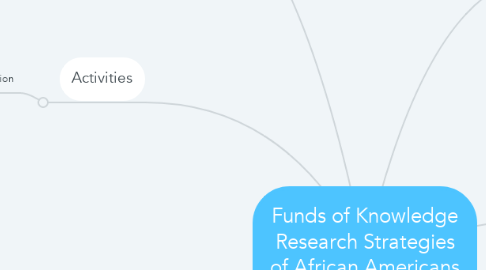
1. Knowledge Bases
1.1. Question
2. Skill Sets
2.1. Question
2.1.1. What knowledge does the marginalized population have that function as an asset or strength to their individual learning development?
2.1.1.1. Unwritten knowledge of what it is like growing up poor - able to identify the good things that came from growing up poor
2.1.1.2. Knowledge base of perspective and being able to understand where others are coming from
2.1.1.3. Reaffirming knowledge of who African Americans are as people and what they offer to the world
2.1.2. What skills do the marginalized population possess that function as an asset or strength to their individual learning development?
2.1.2.1. Answers
2.1.2.1.1. Cultural competence
2.1.2.1.2. Preserverance
2.1.2.1.3. Survival and fighting for what you believe in
3. Experiences
3.1. Question
3.1.1. What personal experiences do the marginalized population have that function as an asset or strength to their individual learning development?
3.1.1.1. Know what it's like to go without/have the bare minimum growing up, therefore more grateful for the little things in life
3.1.1.2. Answers
3.1.1.2.1. Has developed a sense of self acceptance after learning from cruel hardships in school, such as girls making fun of their hair type
3.1.1.2.2. Grew up taking care of siblings and going to school at the same time, therefore good at multitasking
4. Activities
4.1. Question
4.1.1. What activities do the marginalized population engage in that function as an asset or strength to their individual learning development?
4.1.1.1. Answers
4.1.1.1.1. Volunteering opportunities to help other poor people in need
4.1.1.1.2. Talk circles in which a discussion is held about what each person is going through and how they are conquering the hardships
4.1.1.1.3. Sporting clubs in which they can build new social networks and learn new assets from different cultures
5. Household Labor Activities
5.1. Question
5.1.1. What work experiences do members of the marginalized population's household have that function as an asset or strength to their individual learning development?
5.1.1.1. Answers
5.1.1.1.1. The ability to work two jobs in order to support the family, while still raising a family
5.1.1.1.2. Mom stays home and deals with household management, while the dad goes to work each day
6. Social Networks
6.1. Question
6.1.1. What social networks of people do the marginalized population have that function as an asset or strength to their individual learning development?
6.1.1.1. Answers
6.1.1.1.1. Relatives that help reaffirm the importance of staying true to your cultural beliefs
6.1.1.1.2. Teachers that help guide you through your educational career and provide you with resources to help you grow
6.1.1.1.3. Friends and peers that can relate to what you are going through and can serve as a helping hand
